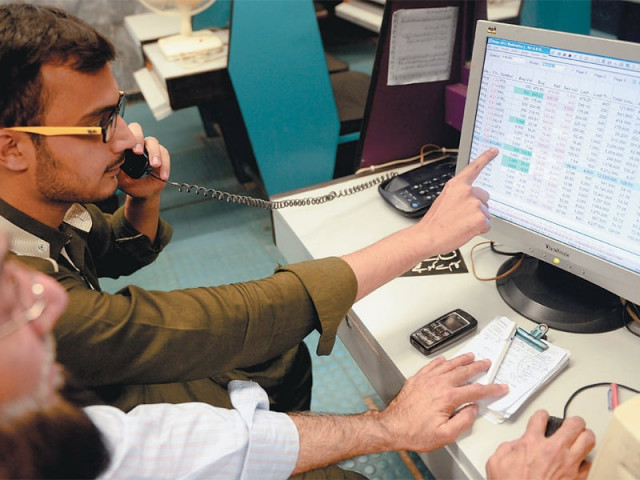Weighing heavy: Iran-Pakistan pipeline drains optimism at Karachi bourse
Index plummets 441 points after president formally inaugurates project.

Investors at the Karachi Stock Exchange following the market’s movements, as fears of possible US sanctions took their toll on the index. PHOTO: AFP
As Pakistan inaugurated a much-delayed gas pipeline project seeking to import fuel from Iran on Monday, investors at the stock market balked at the possibility of incurring the wrath of the US, dumping stocks across the board in an extended bout of panic-selling.
The US has repeatedly opposed the project and investors fear that Pakistan may be pulled into the sanctions currently imposed on Iran for pursuing a ‘controversial’ nuclear energy programme.
The Karachi Stock Exchange’s (KSE) benchmark 100-share index tanked 2.46% or 441.62 points to end the day at 17,522.56 points. This was the sixth consecutive session in which the market has closed in the red territory.
Trade volumes were flat at 235 million shares, compared with Friday’s tally. The value of shares traded during the day was Rs8.23 billion.

“Pakistani equities plunged by over 400 points, with several stocks closing at or near lower limits, as fears of possible US sanctions [...] triggered across-the-board selling,” remarked Jawwad Aboobakar of Elixir Securities.
Shares of 353 companies were traded on Monday. At the end of the day, 51 stocks closed higher, 275 declined and 27 remained unchanged.
“Investors preferred to reduce their exposure before any [further] negative news,” observed Samar Iqbal, head of equity sales at Topline Securities. “Heavyweight Oil and Gas Development Company, Fauji Fertilizers, MCB Bank and Engro Corp contributed heavily to the decline.”
Pakistan Telecommunication Company was the volume leader with 20.64 million shares, losing Rs0.49 to finish at Rs20.27. It was followed by Engro Corporation with 18.67 million shares, losing Rs5.45 to close at Rs122.53 and Jahangir Siddiqui and Company with 17.91 million shares, losing Rs1 to close at Rs13.94.
“Despite positive news flow over the weekend, Engro Corp was not able to sustain the momentum, as uncertainty over gas pricing and possible decline in urea prices kept the fertiliser sector under pressure,” reported Aboobakar. “Likewise, refineries and exploration and production companies closed negative despite being in favour last week over the increase in deemed duty and the issue of new exploration licences.”
Foreign institutional investors were net sellers of Rs86.34 million worth of shares, according to data compiled by the National Clearing Company of Pakistan Limited.
A correction or a crash?
Analysts unanimously said that the inauguration of the Iran-Pakistan gas pipeline was the most prominent development during the day which led to the selling spree. However, they also clarified that this was not an isolated trigger.
“The market has been growing at a rapid rate,” remarked Kashif Mustafa, the head of business development at Lakson Investments. “When the market expands at this rate, any major news becomes a reason for correction.”
“Pakistan is heavily dependent on the US for aid and funding, and the fear of sanctions is very tangible,” he continued. “However, the fundamentals are strong and the market will recover if the US does not take any action that affects our balance of payments.”
“The coalition support fund and other aid may be withheld, which is a major source of concern for Pakistan,” added Arif Habib Corporation’s Head of Research Khurram Schehzad. “Otherwise, the fundamentals are fine. This is purely market risk. The government is in transition and is to be dissolved sometime this week, which is adding to the uncertainty. Once elections are announced, the investors will regain some confidence,” he added.
“Investors were similarly worried when the market corrected nearly 500 points in January, but then it went on to add 2,000 points as of last Friday,” recalled Azfar Naseem, Head of Research at Elixir Securities. “This correction was due. You cannot say the gas pipeline has alone caused the decline, because investors knew beforehand it was going to happen. It was open knowledge.”
“The earnings announcements season is over and there are no significant triggers, which is why the news seems so important,” he continued. “Behind the scenes, however, you have investors worrying about Engro’s gas pricing issue and the end of this government’s tenure.”
Published in The Express Tribune, March 12th, 2013.
Like Business on Facebook to stay informed and join in the conversation.


















COMMENTS
Comments are moderated and generally will be posted if they are on-topic and not abusive.
For more information, please see our Comments FAQ